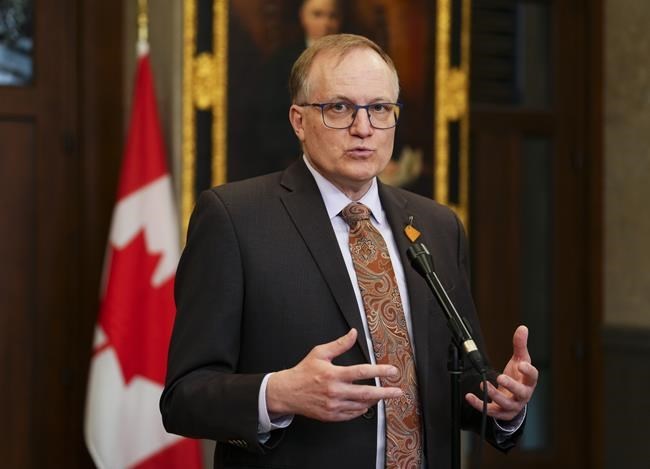OTTAWA — Canadians can be confident there will be a public inquiry into foreign interference, New Democratic House leader Peter Julian said Thursday.
Opposition parties wanted the government to announce the inquiry before the House of Commons rose for the summer break, and for the last two weeks Intergovernmental Affairs Minister Dominic LeBlanc has been leading intense talks to find a consensus among the parties for an inquiry.
But there was unanimous consent for the House of Commons to rise Wednesday, two days ahead of schedule, without any such agreement. MPs won't return to their seats until Sept. 18.
The inquiry negotiations continued Thursday, with LeBlanc meeting with House leaders again.
"I am confident, as we're having these discussions now about what form that public inquiry would take, that we will get there," Julian said in an interview.
"We can be optimistic that that public inquiry will be in place after some further discussion."
He would not provide any specifics about what the sticking points are in the talks or when he thinks things might be resolved. He did say he feels the NDP has been instrumental in getting to this point.
Bloc Québécois Leader Yves-François Blanchet said Wednesday he felt an agreement could be a few days, or even just a few hours, away. Government House leader Mark Holland said he thought things could be decided "very soon."
Conservative Leader Pierre Poilievre insists he will not provide input on a possible commissioner or terms of reference until the government commits to actually holding an inquiry.
The government has been adamant it will not agree to a public inquiry without opposition parties coming to a consensus about the details.
They want to avoid the intense criticism that met their decision to appoint former governor general David Johnston as a special rapporteur to investigate the issue.
Opposition parties were furious when Johnston recommended against an inquiry last month, and the Conservatives and Bloc skewered the Liberals for appointing Johnston, who they said had too many ties to Prime Minister Justin Trudeau to be impartial.
Johnston then announced he would resign after issuing a final report by the end of June. And that's when LeBlanc was tasked by Trudeau to work with opposition parties on a way forward.
Details on who will lead an inquiry, what it will look at, and its timeline are all part of the ongoing negotiations.
Julian noted that the opposition parties supported two NDP motions in favour of a public inquiry, and the most recent, on May 31, called for the House procedure committee — which MPs call PROC for short — to choose a commissioner and recommend what the inquiry's mandate should be.
"I'm optimistic that PROC will not need to do that if we come to agreement," he said.
That motion also called for the inquiry to look at attempted foreign interference from multiple countries, including China, Russia and Iran.
The Liberals tried hard in the waning days of this session of Parliament to highlight their accomplishments despite the chaos that unfolded as the government struggled to deal with allegations that Beijing attempted to interfere in the last two federal elections.
All parties have agreed the outcome of the elections were not impacted by those attempts, but believe a public inquiry is needed to ensure Canada is prepared to withstand future attempts.
Holland said Wednesday the government passed 15 bills in 15 weeks, including one that enshrines the national child care plan in law.
This report by The Canadian Press was first published June 22, 2023.
Mia Rabson, The Canadian Press



